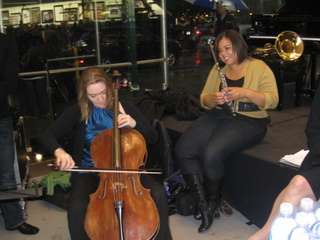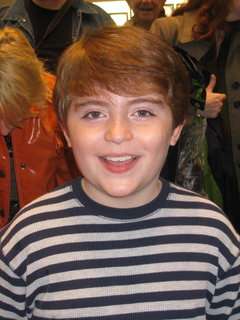|
Back
Notes Among the Strollers New York
Apple Showroom, 1981 Broadway
04/26/2010 -
Igor Stravinsky: Fanfare for a New Theatre
György Ligeti: Six Bagatelles
Zach Detrick: Five Duets for Flute and Bassoon (World Premiere)
David Bernard Roumain: Five Chairs And One Table
Hugo Wolf: Italian Serenade
Paul Schoenfield: Cafe Music
Ensemble ACJW: Brad Balliett (Bassoon), Brenton Caldwell (Viola), Julietta Curenton (Flute), Owen Dalby, Yonah Zur (Violins), Angelina Gareliya, Conor Hanick (Piano), Alicia Lee (Clarinet), Alma Maria Liebrecht (Horn), Paul Murphy, Brandon Ridenour (Trumpets), Arthur Sato, James Austin Smith (Oboes), Saeunn Thorsteinsdottir (Cello)

S. Thorsteinsdottir & J. Curenton (© Harry Rolnick)
As usual, Shakespeare said it best:
”Most heavenly music! It nips me unto listening!"
The concert last night at Apple–yes, the Apple store on Broadway and 67th Street–was, amongst other things, the happiest concert I’ve yet attended.
Apple had no seats. But an audience of perambulating nerds, kids, old fogies, drippy people coming out of the rain, curious bystanders and even a few musicians were nipped into happiness. The musicians, New York’s finest instrumentalists, came from “The Academy”. This is a virtual (not bricks-and-mortar) institution, sponsored by Carnegie Hall, Juilliard and the Weill Music Institute, and they were obviously delighted. The single composer who attended, Zach Detrick, was beside himself (and his family) with happiness after his world premiere.
It was a most unusual venue. The pristine-white spacious Apple Showroom, with its 100-odd-foot ceiling and endless tables of iPads was used, for the first time, as a concert hall. Customers who thought they would fool around with these mechanical toys were surprised, and then mesmerized when they heard unusual sounds from different corners of the showroom. For promptly at 7 p.m. in the far northwest corner, came the resounding sounds of two trumpets. At first it was a fanfare, but in five seconds, they were playing dissonant notes together. Obviously this was a welcome, but who knew that this was Igor Stravinsky actually experimenting with 30 seconds of atonal music. So clear was the sound that even the most dedicated geek looked up in somewhat pleased astonishment.
Now move to the center front eastern side, facing on the rainy sidewalk. Here were six players tootling away at music which…well, which sounded like fun but wasn’t quite er…right! Yes, this was Ligeti in music which (to Us Sophisticates) was mother’s milk: the Six Bagatelles. To the standup audience, though, the sounds of the composer, which they might have known through 2001 were fascinating. I guess they loved the endless trills in the fifth Bagatelle, but my own favorite was the pastorale second, with the gorgeous flute and oboe line (the flute playing an octave below the oboe).

Z. Detrick (© Harry Rolnick)
Bassoonist Brad Balliett introduced the composer of the world premiere. Zach Detrick is an 11-year-old New Yorker in the fifth grade. Unlike Mozart, he hasn’t written an opera–yet–but his five Duets for bassoon and flute were most proficient. The small scope didn’t preclude some quirky rhythms and wry little melodies. The first had the feel of a Prokofiev, the others were miniature pictures of miniature emotions, ending with a marvelous miniature cadenza–partly improvised, said Mr. Detrick–by Julietta Curenton.
With a two minute-intermission, the Apple Concert Hall became a quasi-cocktail party, minus cocktails and snacks, perhaps, but people roaming about, meeting others, all entranced.
The second half started with Hugo Wolf’s Italian Serenade, performed with all the right lilt (but perhaps archaic under the circumstances). Not, though, the next sounds, these from the south-east corner of the room, where a table and five chairs had been set up for–what else?–a work called One Table and Five Chairs by the eclectic Daniel Bernard Roumain. Originally written for clapping hands, tapping table-top, a few grunts, and finger-snaps, the five players of Ensemble ACJW had their own version, which included pots and pans.
Like the music of Harry Partch–but without Partch’s invented instruments–the work was sheer fun. When ACJW visits schools, this is the music which not only entertains kids, but which serves as an interactive means of showing music as ordered sound.

The Ensemble ACJW (© Jennifer Taylor)
Finally, Paul Schoenfeld’s Cafe Music was three movements of elegant “salon music” albeit with brilliant piano work, some experiments into Viennese-Russian-style classicism in the second movement, and a suitably jazzy finale.
The piece was new to me, as it was to the strolling listeners. To paraphrase Mahler’s song about the sermon to the fish, “The audience heard the sounds happily, and when it was finished, swam on to the next iPad."
Harry Rolnick
|